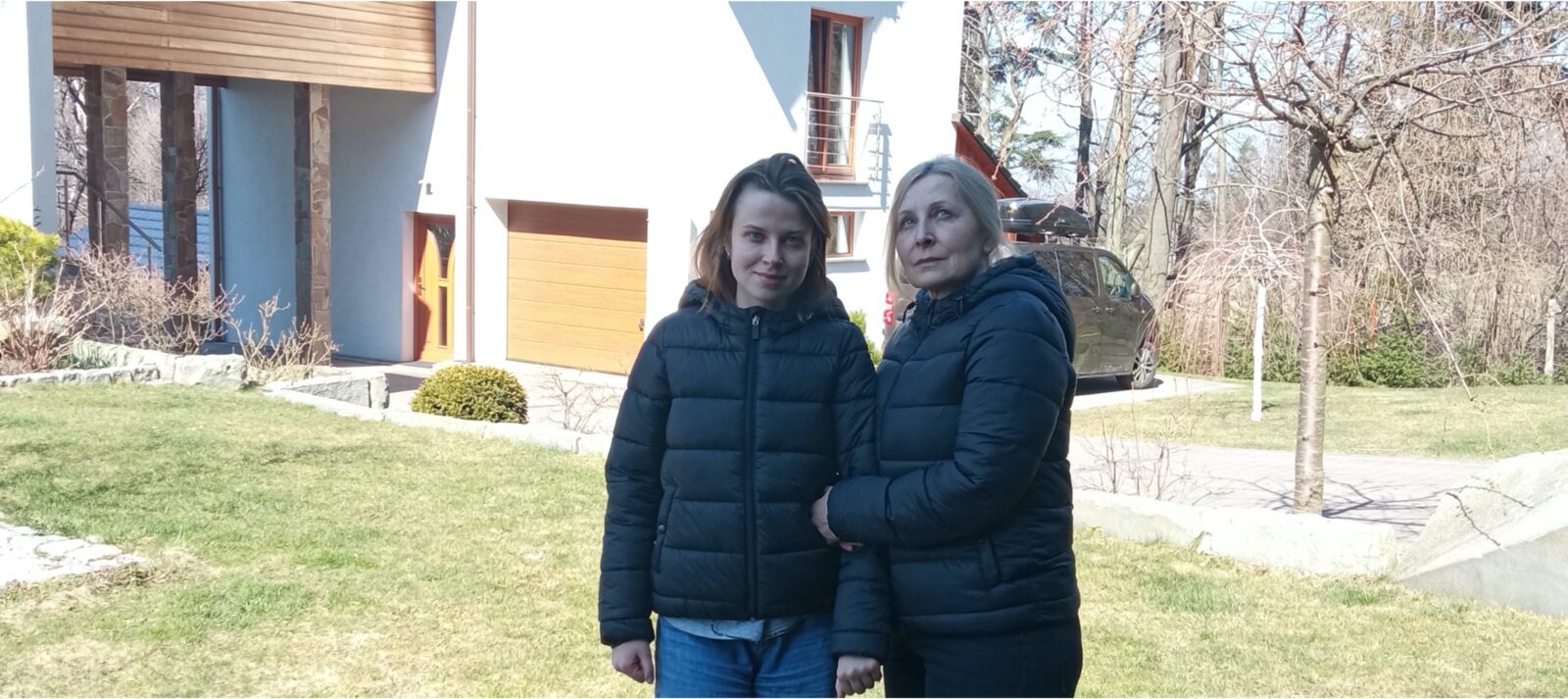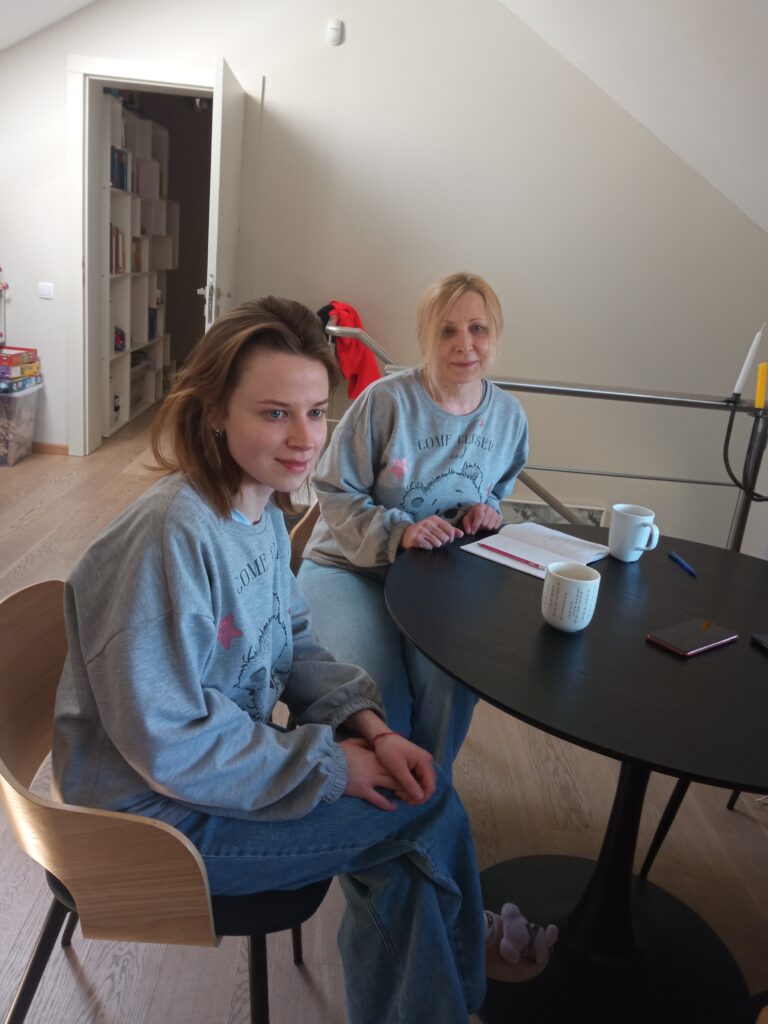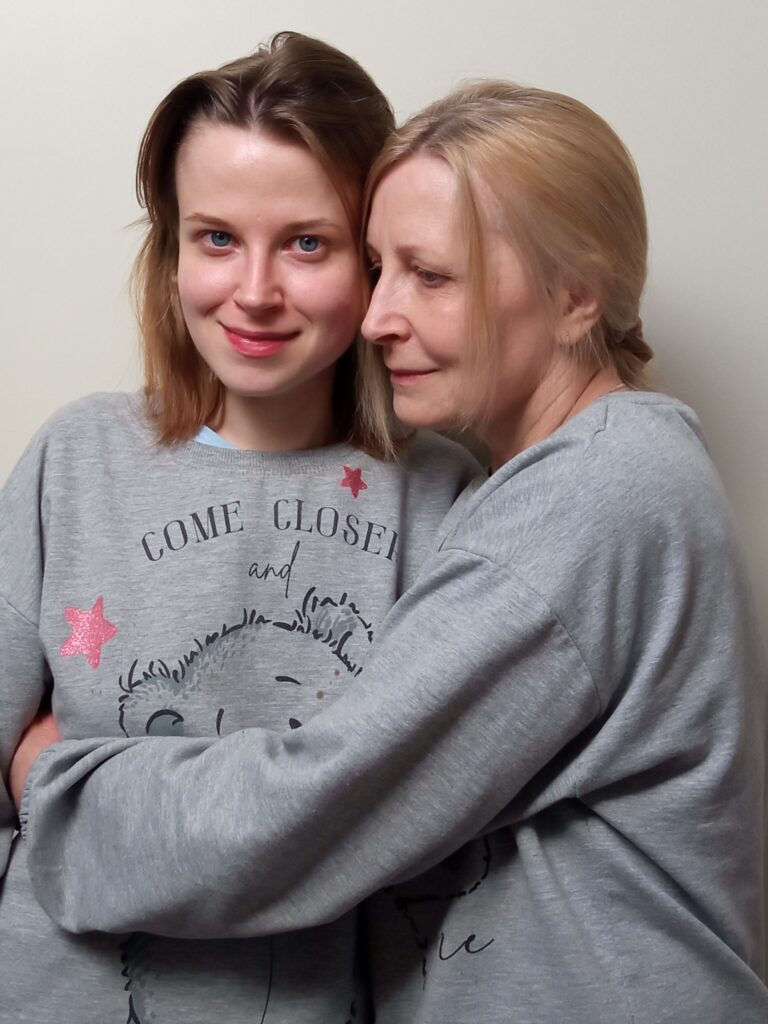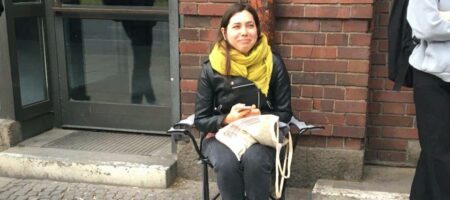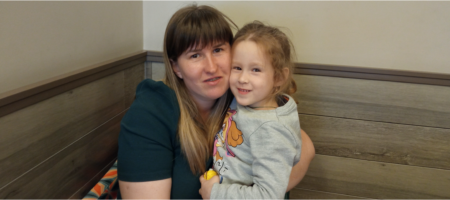Julia is 28 years of age and from Sumy, a city in north-eastern Ukraine. Together with her parents, who are divorced but get on well, Julia has lived in the same town all her life.
Today, Julia and her mother, Nelia, are sitting at a large dining table in a bright dining room of a family home in Ustroń, Poland. The house belongs to refugee hosts who, until recently, were complete strangers to the women. In the background, three of the host family’s children are laughing and playing with their huge dog. Julia and Nelia each wear the same jumper; it highlights the closeness between them.
Julia and Nelia listened to the Ukraine news in the lead up to the war, but didn’t believe much of what they heard. They have become used to hearing politician’s words but never seeing their actions. When the war started Julia and her mother, Nelia, received a call from one of their relatives. They couldn’t believe that what she had relayed to them was true.
Only someone insane would think there could be a war in the 21st century.
Very quickly, Julia and Nelia’s doubt vanished. The news reported that boys of 16 years old had been gunned down at Cadet Corps, Sumy’s military training school. The two women left their building to buy food. At the supermarket, crowds of people were leaving with as much food as they could carry.
The more you buy, the longer it will be until you have to go out.
Julia and Nelia bought a lot of food and swiftly returned to their flat. They found themselves sitting in silence, frightened and feeling lost without a plan. From the windows, they could see many people running, fleeing the town to return home. But Julia and Nelia were already home.
We didn’t have a place to run to. We don’t have a house in a village. We had nowhere to hide.
They had heard people saying that the Russians would only bomb military targets and would leave citizens and civilian buildings alone. However, when news came that Kyiv had been bombed from the air they understood that there was no particular plan or strategy to the bombing – and that anything was likely.
Julia works remotely for an American logistics company as a sales agent. Julia found it increasingly hard to work. Air attack alarms were sounding every 1-to-2 hours and she would need to run to the shelter to be as safe as possible.
The job isn’t super interesting for me but it brings rather good income and for this hard period, that is the most important thing.
While in the flat, Julia and Nelia began hiding out in their bathroom, wearing their hats and winter coats to protect themselves from possible wounds while they tried to sleep, and covering themselves with their mattresses for protection from potential wreckage.
Sometimes we even ate in the bathroom.
Julia’s performance at work was being affected. As this was the only source of income for her family, this was the reason they decided to begin planning to leave for a safer place. But it wasn’t an easy choice; the news was constantly reporting that civilian cars and public transport were being shot at as they tried to leave the town.
We were very afraid to go and also afraid to stay.
Both women are still thinking about a strange occurrence they experienced together just days before the war started. The mother and daughter were at home in their flat, in separate rooms, when they both heard the sound of a bell. There was a small bell – a decorative souvenir – on a table in another room. But no one else was home at the time to make it ring. Julia and Nelia describe themselves as spiritual and believe in God. So, Nelia checked the meaning of the sign: ‘news or war’. She now feels like God’s spirit was trying to warn them. Julia could not sleep during the night before the war began; she believes she could sense that something was going to happen.
The pair made the decision to move from Sumy, but were not able to go during the first day of the ‘green corridor’ as this was allocated for foreign students.
The green corridor for the foreign students was much more organised than the one for Sumy’s citizens.
On the second day, Julia and Nelia went to the gathering point with Julia’s Godmother also, and joined around eight thousand others who were waiting for transportation in a huge queue. The three women stayed there from the morning until 6pm. It was cold and they were very hungry. No transport arrived.
We had the feeling of being betrayed by someone who was supposed to take responsibility and protect us.
Further disappointment was in store when it transpired that the transport from this point was not free; every passenger was expected to pay a fee of 3500 uah. The town administration commented, explaining that there wasn’t an appropriate arrangement between two parties who had organised the transport. However, the drivers trying to charge passengers were actually arrested.
After two days of queuing to leave on government transport, but having to return home, Julia, Nelia and Julia’s Godmother were able to leave. A 17 year old man agreed to help the three women in exchange for money and drove them to Poltava in central Ukraine. From there, they took the train to Poltava-Uzhgorod and decided to get off in Lviv because it would be easier to get to Poland from there. When they got off the train they were shocked by the enormous crowd of people; they could not move and it looked like it would be impossible to exit the station. The train had not yet left so the three women got back on the train and headed to Uzhgorod, at the border of Slovakia.
The process of crossing the border at Uzhgorod was very long. There were many volunteers and Julia, Nelia and Julia’s Godmother were very thankful for the help, warmth, tasty food and hot tea that was offered to them. The biggest problem was the language barrier. It was only due to Julia’s English fluency that they were able to understand the details of the procedure; many other refugees were struggling to understand directions and guidance.
The conditions of that first night in Uzhgorod were horrible. Accommodation consisted of tents with mattresses on the floor and it was obvious to Julia that they would need to start searching for another place. The situation was quite chaotic and it was hard to locate anyone who could help them to find somewhere to stay. Julia finally met a man named Philip, who directed the three women to a bus destined for Koshica, where there was another volunteer’s centre for refugees. It took 1.5 hours to get there, but the centre was very well equipped with better sleeping facilities, varied and tasty food, and medical assistance. Through talking with people, however, Julia began to realise that it seemed almost impossible to find a place to stay; everywhere was overfilled. Eventually, Julia secured a small room in a hostel.
On the way to the hostel, the driver (another volunteer who was donating his time to help) explained to Julia that Slovakia’s people are divided about the conflict in Ukraine. 50% of them support the Russian president because they are against America. When Julia, Nelia and Julia’s Godmother arrived at the hostel they were finally able to wash and sleep for the night. It was a relief, and also important to them that they could pay for themselves and had the agency to buy what they wanted.
Poland was the next destination. A friend of theirs from Ukraine had previously arrived in Poland and had found a good variant of accommodation. A family – Joanna, Jamie and their four children – were inviting Ukrainian refugees to stay in their house. Julia and her mother felt very embarrassed that they were interfering in someone’s family life, but they tried to find out more about the family routines.
What rules do you follow in your family?
The inviting family, however, were very warm-hearted and open-minded. They explained that, while the guests were staying with them, they wanted them to feel part of the family. The four children, when told of their parents’ decision to accept refugees, had been excited to help people in need and had begun proposing their bedrooms and why they would be best for the anticipated newcomers. Julia, Nelia and Julia’s Godmother felt supported and safe.
For now, Julia and Nelia are remaining with Joanna, Jamie and their family. Julia’s Godmother decided to leave to join her daughter, who had also left Ukraine and ended up in Germany. Julia says that her and her mother are doing their best to get used to their current life with another family.
I believe that there are more kind people around. They want to help and make others happier.
Both women have great hope that they will be able to return home as soon as possible, although the situation is still completely uncertain.
“I’m proud to be Ukrainian.” This is the sentence that Julia chose to finish the telling of her story.
Posted on March 28th, 2022
Voices Ukraine

